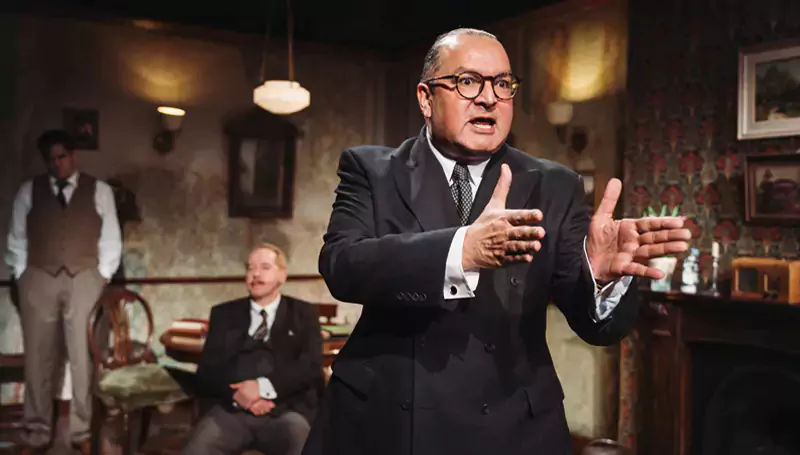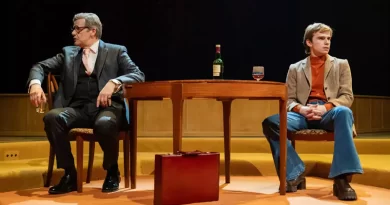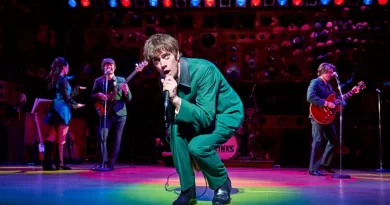“Farm Hall” at Theatre Royal Haymarket
Jeremy Malies in the West End
19 August 2024
From Lawrence Krauss to Stephen Hawking by way of Oppenheimer, Einstein, and Heisenberg, physicists are our new moral philosophers. I take that as the message from Katherine Moar’s play set during the four months in 1945 between the Allies’ Victory in Europe and Victory over Japan Day. The play had an initial run at the Jermyn Street Theatre early in 2023. Its plot has us at a house near Cambridge which is bugged with the best technology of the time as six leading scientists (there were in fact ten) from the Axis Powers are kept under house arrest. They discuss progress of the war, past experiments, colleagues, and the colossus that was Einstein who is now in New Jersey.
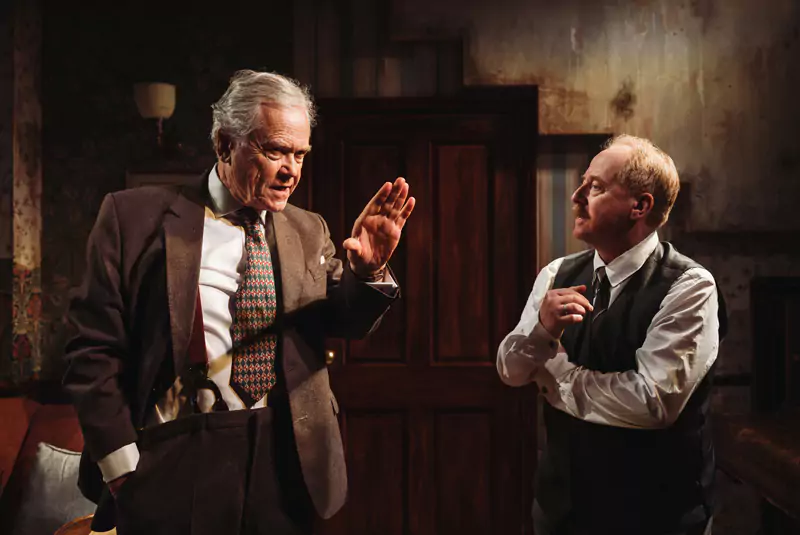
David Yelland and Forbes Masson.
Photo credit: Alex Brenner.
Most of the men have been snatched by the Allies from a physics institute in the Black Forest where they had been working with a part-finished nuclear reactor pile. The intelligence exercise was known as Operation Epsilon. The play opens with the men (bizarrely) acting out Noël Coward’s Blithe Spirit. I can’t see any thematic link and though a film adaptation had been made that year, it would hardly have been available to the scientists, holed up as they are with only chess sets, some English and Irish fiction, and a decrepit piano which radiochemist Otto Hahn (played by Forbes Masson) vainly tries to repair. It is perhaps a metaphor for the frustrated and discordant German war effort.
Moar’s gossamer humour takes various forms. There are Beckettian gags about the fact that not a lot is happening, as well as wry reflections on the Germanic perception of the Anglosphere and a Stockholm Syndrome identification with their gaolers. “Nobody wanted Hitler to win by the end.”
This is to an extent verbatim theatre since Moar has had access to now declassified transcripts. She has the gift of making scientific concepts digestible and we are soon plunged into a discussion of effervescence as it relates to particle physics. The men are cohesive as a unit at first but not above bickering about their individual achievements, with director Stephen Unwin marshalling this skilfully. Unwin proves deft with the constant suggestions that the physicists suspect their courteous cricket-playing supervisors are eavesdropping and even making recordings which of course they are.
This theme is expanded when the men listen to a Home Service broadcast reporting on the bombing of Hiroshima, a scene that sound designer John Leonard pulls off adeptly. The scientists’ reaction is intense, but momentarily they suspect that even this is a set-up to test them out and ascertain how far off such a breakthrough they had been themselves. There is humour when the truth dawns: “It does make us look rather second-rate!” Later, the tone is darker as Erich Bagge played by Archie Backhouse asks Kurt Diebner (Julius D’Silva – a doppelgänger for his character) just how close he was to inner Nazi circles and how much blood he has on his hands.
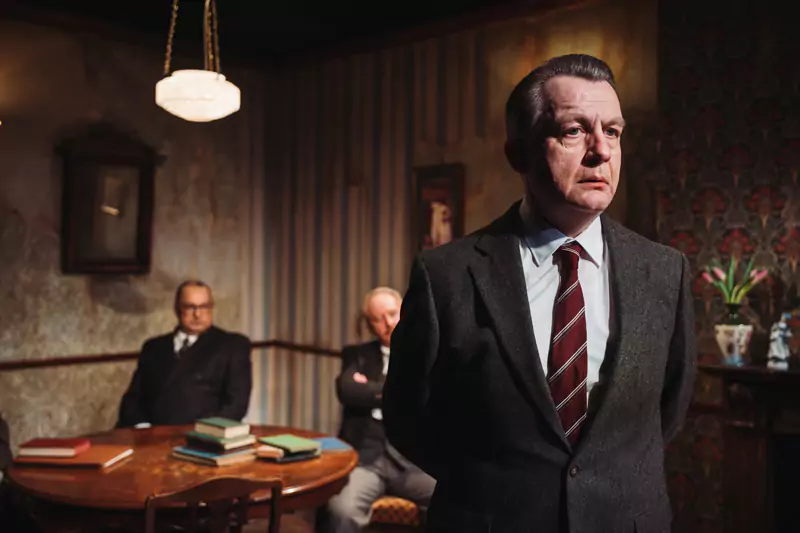
Alan Cox as Werner Heisenberg.
Photo credit: Alex Brenner.
The play is to an extent anchored on the charismatic (and probably preeminent in this group) Werner Heisenberg played by Alan Cox who conveys the decency of a man who risked torture when he lied to Hitler about his progress and fabricated obstacles. The play puts me in mind of Michael Frayn’s Copenhagen which features Heisenberg and Niels Bohr – not a character here but mentioned many times. Both plays argue that successful science is not consistent with a totalitarian state. Hitler never got his head around nuclear chain reaction, but he could understand the concept of rockets for which he had a “fetish”. Disproportionate investment in the V-2 missile programme with directions from the very top cost the Axis Powers dearly.
Perhaps the central muscle of the play is a scene in which Heisenberg and Hahn take a macro lens to the failings of the Axis Powers. Another crucial moment is a description of how in London in 1933, observation of a traffic light sequence in Southampton Row allowed Hungarian Leo Szilard (not an on-stage character and part of the Manhattan Project) to tumble to the idea of fission. The pervading bonhomie is leavened by abject terror, notably when characters fear for loved ones on hearing that their home towns have been occupied by Soviet troops. The piece is concentrated; the Germans fetch and carry everything for themselves with not a single British warden appearing to distract from the main dynamics.
The central point perhaps is that by giving Jewish scientists a safe passage to the United States as well as employment, Roosevelt and Truman did much to win the war for the Allies. The physicists shown here were flown home in a single plane in January 1946. An example of the frequent gallows humour has Bagge quipping that if the chosen aircraft is old then it’s likely that they are all going to be killed in a deliberate crash. Bagge also announces that he wants a career change and a move into philosophy. (He would stick to physics and excelled at harnessing nuclear energy for maritime use.)
With Ukraine’s incursion into Russia, continuing tension between China and Taiwan, and the threat of all-out war in the Middle East, this production is timely. The central issues will always be thought-provoking as witnessed by the fact that the same events have produced a broadly similar play, Operation Epsilon by Alan Brody. Both dramatists make the point that Hitler’s small mindedness saw him keep his scientists in separate groups rather than a collaborative whole in order to encourage what he thought would be productive rivalry. Two fine playwrights show that mainland Europe avoided stumbling towards a nuclear twilight only because of the whims and rudimentary education of a dictator.

